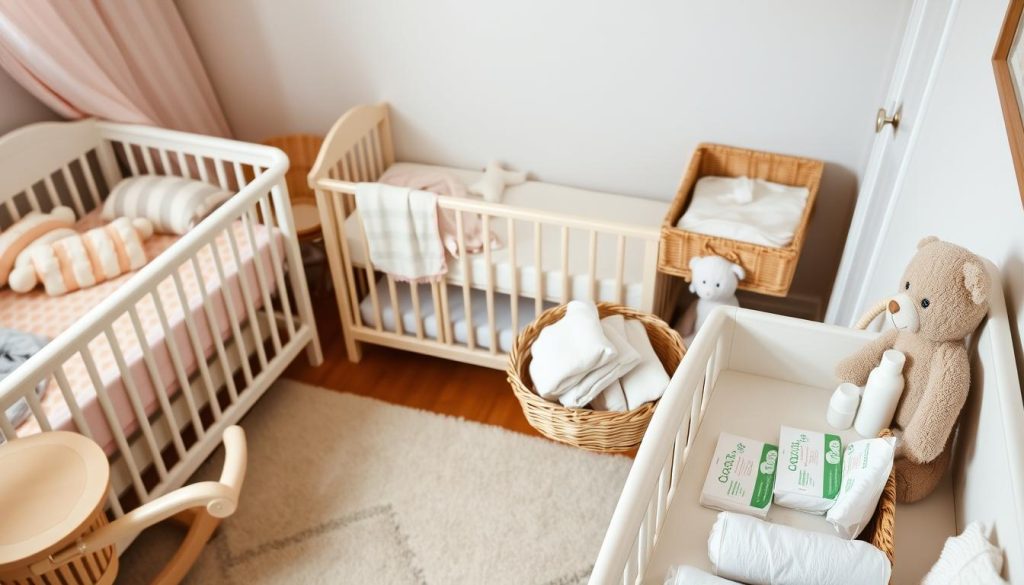
Welcoming a newborn is both exciting and scary. Holding your baby for the first time fills you with joy and worry. This guide offers 21 newborn baby tips to help you feel more confident and prepared.
This resource is perfect for first-time parents or those looking to improve their care routine. It covers everything from feeding and sleep to soothing and practical tips. Let’s start this journey together, focusing on your baby’s health and your peace of mind.
Key Takeaways
- Discover 21 essential newborn baby tips for first-time parents
- Learn the fundamentals of newborn care, including feeding, sleep, and daily routines
- Explore practical advice to make parenting easier and more enjoyable
- Gain confidence in navigating the early stages of parenthood
- Ensure your newborn’s well-being and your own peace of mind
Introduction to Newborn Baby Tips
Welcoming a newborn is both exciting and challenging for first-time parents. The transition to parenthood brings sleep loss, routine changes, and financial stress. But, with the right guidance, you can face this journey with confidence and find joy.
We’ll give you an overview of newborn care, baby essentials, and parenting guidance. This will help you and your family thrive in the first few weeks. We’ll cover key aspects like understanding newborn basics and setting a consistent schedule.
Every newborn is different, so be patient and flexible. Don’t forget to take care of yourself too. Seek help from loved ones, healthcare professionals, or parenting communities. Together, we’ll explore the joys and challenges of newborn care, helping you build a harmonious family life.
“Newborns delivered vaginally typically stay in the hospital for about 48 hours, while those delivered by cesarean usually stay for around 96 hours.”
Before your baby arrives, learn about essential newborn baby information. This includes:
- Newborn screening tests and procedures
- Feeding schedules and techniques
- Sleep patterns and soothing techniques
- Diapering essentials and tips
- Developing a safe and comfortable nursery
Knowing these basics will make you feel more confident and ready for early parenthood. Remember, it’s a learning journey. With time, you’ll find your rhythm and develop strategies that suit your family.

In the next sections, we’ll explore more newborn care, baby essentials, and parenting guidance. Get ready for a transformative experience filled with love, growth, and cherished moments with your little one.
Understanding Newborn Basics
Starting out with a newborn can be thrilling yet overwhelming for new parents. Knowing the basics of newborn care can make you feel more ready and confident. We’ll cover the key points of newborn development, essential baby items, and useful tips for this journey.
1. Learn the Essentials of Newborn 101 for New Moms
It’s key for new parents to learn the newborn care basics. This includes knowing about your baby’s sleep, feeding, and diaper needs. Newborns sleep a lot, from 16 to 18 hours a day, in short bursts.
They need to eat every 2-3 hours, even at night. Breastfeeding moms should feed their babies before they cry, as crying means they’re hungry.
Newborns need to be changed 8-12 times a day. They only need to bathe 2-3 times a week to keep their skin moist. It’s also vital to have a good relationship with your pediatrician. The American Academy of Pediatrics suggests seeing your baby within 3-5 days after birth and again before the first month ends.
2. Gather Basic Newborn Baby Information for First-Time Parents
Understanding your baby’s developmental stages and how to read their cues is also important. Newborns have six “baby states” that help parents know their needs. Recognizing when a baby needs a break, like sneezing or yawning, helps build a strong bond and prevents too much stimulation.
Comforting a crying baby can be done in many ways. Try stroking, talking softly, humming, or singing. Going for a walk or giving a warm bath can also help. But never shake or shout at a crying baby. If you’re feeling too much, put the baby in a safe spot and take a break until you’re calm again.
By learning these newborn basics, you’ll be more prepared for the early weeks of parenthood. You’ll be able to give your baby the best care possible.
Creating a Newborn Schedule
Creating a routine is great for you and your newborn. It helps your baby feel secure and know what to expect. But remember, every baby is different, and their needs change over time. Being flexible is key in caring for a newborn.
3. Start Building a Baby Routine Early
Experts say to start a schedule between two and four months. In the first few months, babies might sleep more during the day and wake up a lot at night. Starting a routine early helps your baby get used to sleeping better at night.
4. Establish a Consistent Newborn Schedule
- Aim for 14-17 hours of sleep in a 24-hour period for newborns (0-3 months).
- Offer daytime feedings every 2-3 hours, based on your baby’s hunger cues.
- Limit naps to no longer than 2 hours during the day.
- Introduce a bedtime routine as early as 8-12 weeks old.
- Communicate your baby’s routine with caregivers to maintain consistency.
A routine makes your newborn feel safe and secure. By tracking their feeding, sleep, and play, you can plan your day better. Stay flexible and adjust as your baby grows and develops.
“Establishing a routine for newborns provides comfort and security, as babies know when to eat, sleep, play, and bathe.”
| Newborn Sleep Needs | Newborn Wake Windows | Newborn Feeding Schedule |
|---|---|---|
| 14-17 hours of sleep in 24 hours | 35-90 minutes | Every 2-3 hours during the day |
Baby Sleep Tips for Newborns
As a new parent, making sure your newborn gets enough sleep is key. It’s important for their health and growth. Starting good sleep habits early helps both you and your baby. Here are some newborn baby sleep tips for better rest for your family.
5. Follow Newborn Baby Sleep Tips for Better Rest
Newborns often wake up to feed several times a night. To help them sleep better, try these tips:
- Start a bedtime routine to tell your baby it’s time to sleep.
- Make the nursery cool, dark, and quiet for better sleep.
- Watch for sleep cues like yawning and eye-rubbing to catch them before they get too tired.
- Always place your baby on their back in a safe crib or bassinet without loose bedding.
6. Manage the First Week’s Sleep Adjustments
In the first few days and weeks, your newborn might have trouble sleeping right. They might sleep more during the day and be awake at night. Here’s how to help:
- Keep the daytime bright and fun to help them stay awake.
- Keep the night quiet and dark to signal sleep time.
- Feed your baby quickly at night to keep them energized.
- Don’t be afraid to ask for help from family and friends during this time.
Every baby is different, and it might take time to find the best sleep training methods. But with patience and consistency, you can help your newborn sleep well. This will benefit everyone in your household.
| Newborn Sleep Needs | Average Hours of Sleep per Day |
|---|---|
| 0-4 months | 11-19 hours |
| 4-6 months | 12-16 hours |
| 6-12 months | 12-15 hours |
“A consistent routine is key in teaching babies to sleep through the night.”

Feeding Your Newborn
Proper nutrition is vital for your baby’s growth and development. As a new parent, understanding the basics of newborn feeding is important. Whether you choose to breastfeed or bottle-feed, a consistent feeding routine is key.
7. Understand Newborn Feeding Basics
Breastfed newborns nurse every 2 hours, with 10-12 sessions in 24 hours. They start with 1 oz per feeding, increasing to 4.5 oz by a year. Bottle-fed newborns eat every 2 to 3 hours, with 8 feedings per 24 hours at first. By the end of the first month, they may consume 3 or 4 ounces per feeding.
8. Develop a Consistent Feeding Routine
Creating a consistent feeding routine helps your newborn feel secure. By 6 months, they might intake 6 to 8 ounces at each feeding. They also start adding solid foods to their diet. Pacifiers are suggested for comfort for healthy-weight babies after feeding and around 3 to 4 weeks for breastfed babies.
Regular health check-ups, including weight checks and growth chart monitoring, are essential. They ensure your newborn is gaining weight and developing as expected. Babies born early should be closely monitored for weight gain, as they might be sleepier and consume less in the early weeks.
| Feeding Type | Newborn Feeding Frequency | Feeding Amount |
|---|---|---|
| Breastfeeding | Every 2 hours, 10-12 sessions per day | 1 oz per feeding, increasing to 4.5 oz by 1 year |
| Bottle-feeding | Every 2-3 hours, 8 feedings per day | 3-4 oz per feeding by the end of the first month |
Remember, every baby is unique, and their feeding needs may vary. Stay in close communication with your pediatrician. This ensures your newborn is receiving the right breastfeeding advice or bottle feeding support for their newborn feeding requirements.
Diapering Essentials and Tips
Diaper changing is a big part of parenting. It’s important to be ready and know what to do. We’ll cover the basics of changing diapers, share tips, and talk about preventing and treating diaper rash.
9. Stay Prepared for Diaper Changes
Before you start, make sure you have everything you need. A good diaper bag should have:
- Diapers
- Diaper rash cream
- Changing pad
- Hand sanitizer
- Nursing cover
- Burp cloths
- Bottles and feeding supplies
- Pacifier
- Waterproof bag
- Change of clothes
- Nursing pads
Take one diaper for every two to three hours you’re out, plus extras. Change wet diapers every 2 to 3 hours to keep your baby comfy and avoid irritation.
10. Use Newborn Baby Hacks for Easy Diapering
Diaper changing can be tough, but there are hacks to help. Use fragrance-free cream to avoid irritation. Carry disposable diapers for quick changes. Newborns need diaper changes after each pee for comfort.
For sensitive skin, Mustela’s Diaper Rash Cream 123 and Diaper Cream with Olive Oil and Aloe are great. Mustela’s Liniment makes diaper changes easier. Their Stelatopia Skin Soothing Pajamas are perfect for eczema-prone babies. Their Nursing Comfort Balm and Cicastela Moisture Recovery Cream nourish delicate skin.
With these tips and essentials, you’ll feel more confident in diaper changing. Your baby will be comfortable during this important routine.
Mastering Baby Soothing Techniques
Soothing a fussy newborn can be tough for new parents. But, with the right methods, you can calm your baby and bring peace to your home. Let’s look at the key tips and tricks for soothing your baby.
11. Practice Newborn Baby Massage Tips
Infant massage is a great way to bond with your baby and soothe them. Start by stroking your newborn’s skin with light, circular motions. Focus on the legs, arms, and belly.
This helps relax your baby and improves their circulation. It can also ease gas or constipation. Always use gentle, loving touch and avoid too much pressure.
12. Use Soothing Techniques to Calm Your Newborn
- Swaddling: Wrapping your baby snugly in a blanket feels like the womb. It helps soothe and calm them.
- White Noise: The sound of a white noise machine or a fan can be hypnotic. It helps your newborn sleep.
- Rocking and Gentle Movement: Rocking your baby or swaying them can calm them. It feels like the womb’s motion.
Every baby is different, so try various soothing techniques. With patience and practice, you’ll become great at baby soothing. This will help create a peaceful home for your family.
“The key to soothing a newborn is understanding their cues and responding with gentle, loving care. With a little practice, you’ll be a pro at calming your little one in no time.”
Practical Baby Life Hacks for New Moms
Starting your journey as a new mom can be both exciting and challenging. Every moment is precious, and finding ways to make daily tasks easier can be a big help. We’ll share some baby life hacks and baby-wearing tips to help you manage the early days better. This way, you can enjoy more quality time with your baby.
13. Explore Baby-Wearing Tips for Newborns
Baby-wearing is a big advantage for new parents. It lets you keep your hands free while your baby is close. This helps with bonding and makes it easier to do other things. Try out different baby-wearing newborn tips to find what works best for you and your baby.
- Invest in a high-quality, ergonomic baby carrier that provides proper spinal and hip support for your newborn.
- Practice putting on and adjusting the carrier at home before venturing out to ensure a secure and comfortable fit.
- Wear your baby during tasks like light chores, cooking, or running errands to keep them close and calm.
14. Apply Newborn Tips to Make Parenting Easier
As a new parent, parenting tips can greatly simplify your life. From meal prep to bedtime routines, there are many ways to make things easier. This can help you have more time for yourself and your baby.
- Prepare and freeze meals in advance to have nutritious options readily available during the first few weeks.
- Embrace the early days at home, understanding that there may be times when you don’t venture out or engage in activities.
- Limit visitors during the first two weeks to allow for bonding and adjusting to your new role as a parent.
- Familiarize yourself with operating your baby’s stroller and the “rules of the pavement” to make outings more manageable.
- Invest in a sufficient quantity of essential baby clothing items like onesies and vests to minimize frequent washing.
- Don’t hesitate to seek help or advice when uncertain about aspects of caring for your newborn.
By using these baby life hacks and parenting tips, you can feel more confident in the early days. This will help make your experience with your newborn smoother and more enjoyable for both of you.
Building a Safe and Comfortable Nursery
Preparing for a newborn means setting up a safe and cozy nursery. It’s important to pick the right crib and organize baby supplies. Let’s look at a nursery checklist and safety tips to make a peaceful space for your baby.
15. Check Off Your Nursery Checklist for Newborns
Designing a nursery can be overwhelming. But with a checklist, you can make sure you’ve got everything. Start with a calming color scheme, like soft greens, blues, or neutrals. Add natural materials like wood, cotton, and cozy textures for a soothing feel.
Good lighting is key for a nursery. Use soft, warm lights for nighttime and a white noise machine for comfort.
- Invest in storage solutions, like baskets, closet organizers, and under-crib storage, to maintain a clutter-free space.
- Securely anchor furniture to the walls and keep cords out of reach to ensure your baby’s safety.
- Choose elements that can adapt as your baby grows, such as a crib that converts to a toddler bed.
16. Follow Newborn Essentials and Safety Tips
Safety is a top priority in the nursery. The American Academy of Pediatrics suggests that babies share a room with parents but sleep on a separate surface. Consider a twin-sized bed or daybed for overnight care.
Organize toys and clothes for your baby’s growth stages. Use over-the-door organizers and age-appropriate storage for easy access. Sort baby shower gifts and divide toys into labeled boxes to organize the nursery.
| Nursery Essential | Recommendation |
|---|---|
| Lighting | Soft, warm lighting options; white noise machine |
| Storage | Baskets, closet organizers, under-crib storage |
| Safety | Securely anchored furniture, cords out of reach, crib safety standards |
| Adaptability | Crib that converts to toddler bed, growth-friendly elements |
By following these tips, you can create a safe, organized, and comfortable nursery for your newborn.
“Designing a simple, peaceful nursery environment and investing in essential items like a safe sleep surface and a baby monitor are key for creating a harmonious space for your newborn.”
– The Best Doula Training
Developing a Routine for Baby Care
Creating a routine helps you and your newborn feel secure. It includes feeding, sleeping, play, and bonding moments. As your baby grows, you can adjust the routine to fit their changing needs.
17. Incorporate Newborn Baby Routine Tips
Begin a routine early, even in the first weeks. Newborns love knowing what’s next. Try to keep feeding, sleeping, and play times regular. Listen to your baby’s cues to make a schedule that suits your family.
- Start a regular feeding schedule, with meals every 2-3 hours during the day.
- Help your baby sleep well with naps and an early bedtime (7-8 pm).
- Add tummy time, play, and calm activities to your daily plan.
- Get your partner involved in caring for your baby to support each other.
18. Use Newborn Baby Care Tips for Daily Parenting
It’s also key to manage home tasks and take care of yourself. Finding a balance lets you enjoy time with your baby and meet your own needs.
- Make life easier by cooking meals in bulk, using quick appliances, and asking for help.
- Make time for yourself with daily showers, short walks, or relaxing activities.
- Talk openly with your partner about what you need and work together to help your family.
Having a routine for newborn care brings structure and security. By using these tips and adjusting as needed, you can handle the early parenting days with confidence. Enjoy the special moments with your baby.
First-Week Tips for New Moms
The first week with a newborn is both exciting and overwhelming. As a new mom, it’s key to focus on your own care and learn about newborn basics. This guide will help you manage visitors and address health concerns, making the first week smoother.
19. Prioritize Your Postpartum Recovery
After birth, give yourself time to heal physically and emotionally. This means managing pain, dealing with blues, and getting support from family. The American College of Obstetricians and Gynecologists (ACOG) suggests using a heating pad, taking pain relievers, and soaking in a sitz bath to ease pain.
20. Establish a Newborn Care Routine
In the first week, learn the basics of caring for your newborn. This includes umbilical cord care, bathing, and feeding. Newborns need to eat often, and it’s important to call your healthcare provider if they show signs of distress.
21. Manage Visitors and Get Support
Set boundaries with visitors to rest and recover. Ask family to help with chores or meals so you can bond with your baby. If you need more support, reach out to your healthcare provider or a postpartum doula.
The first week can be tough, but with the right help and support, you can do it. Remember to ask for help and take care of yourself as you care for your baby.
| Newborn Health Concerns | Symptoms | What to Do |
|---|---|---|
| Jaundice | Yellowing of the skin and eyes | Contact your pediatrician, as about 60% of newborns experience some degree of jaundice, according to the CDC. |
| Feeding Issues | Lack of wet or dirty diapers, excessive crying, slow weight gain | Reach out to a lactation consultant or your pediatrician for support with breastfeeding or formula feeding. |
| Umbilical Cord Care | Redness, swelling, or discharge around the cord | Keep the area clean and dry, and contact your pediatrician if you have any concerns. |
“Newborns should sleep on their backs in their crib or bassinet, and it’s recommended not to allow more than 3 hours to go by between feedings.”
Conclusion
Starting your journey with a newborn is exciting but also comes with challenges. Remember, every baby is different. You might need to adjust the tips from this article to fit your family’s needs. Trust your instincts and ask for help when you need it. Raising a newborn can be both rewarding and tough.
Being patient and taking care of yourself is key when taking care of newborn baby. Taking care of a newborn can be very tiring, both physically and emotionally. It’s important to look after yourself. Accept help from family and friends for things like babysitting, feeding, or just taking a break.
Remember, newborn care essentials are more than just feeding, diapering, and soothing. Creating a safe and comfy environment for your baby is also important. Plus, setting up a routine that works for your family is vital. By following the parenting guidance in this article, you’ll be ready to face the challenges and joys of caring for a newborn.
Source Links
- https://community.whattoexpect.com/forums/january-2024-babies/topic/first-time-mom-and-im-anxious-about-what-to-buy-for-the-baby-156472585.html
- https://medlineplus.gov/infantandnewborncare.html
- https://www.nhs.uk/start-for-life/baby/baby-basics/bonding-with-your-baby/understanding-your-baby/
- https://www.parents.com/baby/care/newborn/10-things-to-know-about-newborns/
- https://www.healthline.com/health/parenting/newborn-not-sleeping
- https://www.sleepfoundation.org/baby-sleep
- https://peoria.medicine.uic.edu/about/patient-care/university-pediatrics/newborn-guide/feeding/
- https://www.pampers.com/en-us/baby/diapering/article/diaper-bag-checklist
- https://www.christushealth.org/connect/your-health/labor-and-delivery/newborn-sleep-and-feeding-habits
- https://www.cdc.gov/child-development/positive-parenting-tips/infants.html
- https://www.parents.com/baby/care/newborn/what-to-expect-babys-first-week/
- https://www.webmd.com/parenting/baby/my-babys-here-now-what-do




